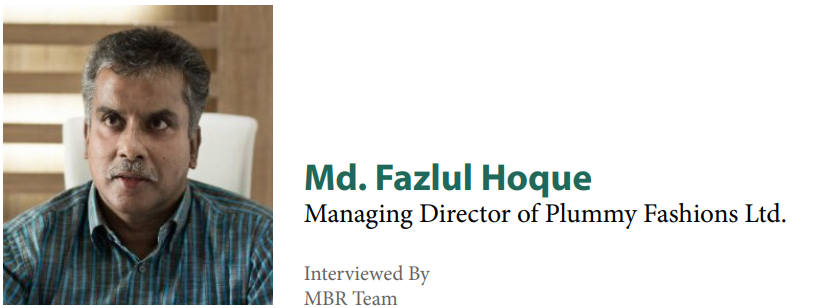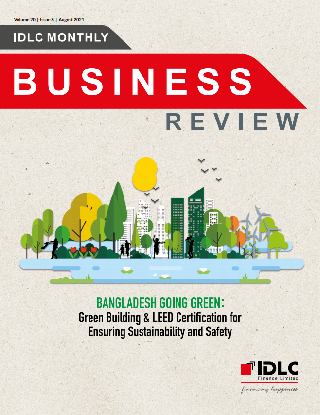
Md. Fazlul Hoque Managing Director of Plummy Fashions Ltd.
Interviewed By MBR Team
MBR: Could you kindly walk us through your journey in making Plummy fashions the greenest knitwear factory in the world? What motivated you into this and what strategies were implemented?
Md. Fazlul Hoque: The journey towards the greenest knitwear factory began with the self-motivation to take the apparel sector to the next level in a positive way. The collapse of Rana Plaza acts as a big motivation as that accident brought a huge negative impact on the sector and so, it was necessary to do something big and create a positive impact. At that time, we decided to go for a world-class green factory, and the decision was derived from sheer self-motivation, no buyers’ pressure or government incentives. At that time, we hired the best consultant from Sri Lanka in order to achieve our goal. At present, there are about 200 LEED certified factories in Bangladesh but we are the pioneer.
MBR: What hurdles did you face in making Plummy fashions a LEED platinum certified factory?
Md. Fazlul Hoque: There were several hurdles from high financing costs to a lack of consultants’ availability. Moreover, some rules and regulations have to be strictly followed to obtain the Leed certification. At the said period, the interest rate was high but the support from both the then BB Governor and a commercial bank made it easier for us to access the low-cost fund which made our Green factory plan commercially viable. There was a lack of consultants who were experts in green factories and so, we had to hire a consultant from Sri Lanka, and as said earlier there are strict rules and regulations, which had to be followed. No matter how difficult the hurdles were, the determination and self-motivation paved the way towards the successful completion of the green factory.

MBR: Kindly share your thoughts on Bangladesh being considered as a bottomless basket in 1971, to being the leader in sustainable green manufacturing worldwide.
Md. Fazlul Hoque: Bangladesh has grown with some wonderful leadership and in the last 1 decade, the country has obtained tremendous economic growth. Although not applaud laud, the RMG sector has played a crucial role in the development. One of the remarkable achievements is the graduation from LDC.
I am proud to belong to that particular sector that plays an important role in the development of Bangladesh and it is a matter of even more pride to lead that sector in a sustainable and environmentally friendly way.
MBR: As going green does not provide any sort of incentive for the customers to prefer your product over others, is there any way in which you would like to encourage the rest of the industry to follow in your footsteps?
Md. Fazlul Hoque: There are two fundamentals behind going for green: Responsibility towards the industry and country; and there must be commercial viability.
There are several challenges: inadequate incentives in the fiscal policy. The given 2% income tax incentive is not adequate and there are no incentives from the buyers and buyers are not willing to pay an extra cent for the green factory products. But the positive thing is, a green factory is always more acceptable than a traditional factory and we are in a better position to negotiate for a better quotation and order.

BANGLADESH GOING GREEN: GREEN BUILDING & LEED CERTIFICATION FOR ENSURING SUSTAINABILITY AND SAFETY
Green Building and LEED Certification: One of the many attempts to ensure sustainability in Bangladesh.
The spiraling concern for saving the environment and its resources has led many platforms to opt for the green building strategy, which takes into account
the environmental factors and efficient distribution of limited resources. Bangladesh has also stepped up in the initiative of Green building strategy, and at present Plummy Fashions, of Bangladesh, is thegreenest knit apparel factory in the world awarded by USGBC ( U.S. Green Building Council). Amongst the
numerous Green Building rating systems available, LEED certification is the most widely used rating system worldwide, as well as in Bangladesh.
Leadership in Energy and Environmental Design (LEED) has 110 credits in total, and consists of 4 levels of certification for industries, offices, retails, residential, and other building projects. LEED Certified buildings are on the rise globally, with the USA occupying the leading position in terms of projects and space. The LEED Certification process consists of four simple steps, starting with registering for a project online through their website.
Within a short time, the number of LEED-certified projects has risen above 160 in Bangladesh, this has led multiple banks and NBFIs, including Bangladesh
Bank, to come up with several financing schemes to help finance the green construction projects. Besides these, Green Transformation Fund and SREUP Financing Scheme (Program to Support Safety Retrofits and Environmental Upgrades in the Bangladeshi Ready-Made Garments Sector) have also come up with initiatives, specific to the RMG industry, to finance green building. Thus, these initiatives have allowed many clients to benefit from the low-cost funds.
With the availability of more funding options and awareness, there can be an upsurge in the number of green building projects in Bangladesh. With climate
change being one of the most heated issues in the contemporary world, it is time to train more experts in this field so that the new generation of professionals will understand the significance of the issue.
Bonnishikha Chowdhury
Executive Officer
IDLC Finance Limited